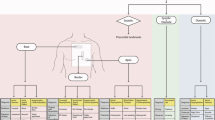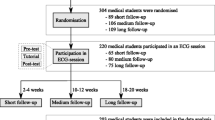Abstract
Although instruction using expert-generated schemas is associated with higher diagnostic performance, implementation is resource intensive. Learner-generated schemas are an alternative, but may be limited by increases in cognitive load. We compared expert- and learner-generated schemas for learning ECG rhythm interpretation on diagnostic accuracy, cognitive load and knowledge acquisition. Fifty-seven medical students were randomized to two experiments. Experiment 1 (n = 29) compared use of traditional teaching frameworks to expert generated schemas. Participants randomly received either a traditional framework or an expert-generated schema to practice each of two content areas in a crossed design. Learning accuracy and cognitive load were measured during the training phase. Discriminating knowledge and diagnostic accuracy were tested immediately after the training phase and 1–2 weeks after. Using the same methodology, experiment 2 (n = 28) compared use of learner-generated versus expert-generated schemas. In experiment 1, learning from expert-generated schemas was associated with lower cognitive load (13 vs 16, p < 0.001), higher diagnostic accuracy on immediate testing (40 vs 29 %, p = 0.018), and higher discriminating knowledge (81 vs 71 %, p < 0.001). Both groups performed similarly on delayed testing (14 vs 8 %, p = 0.6). In experiment 2, use of learner-generated schemas reduced diagnostic accuracy during the training phase (55 vs 77 %, p < 0.001), with similar performance on the immediate (30 vs 33 %, p = 0.89) and delayed (7 vs 5 %, p = 0.79) testing phases.. Learner-generated schema generation was associated with increased cognitive load (17.1 vs 13.5, p < 0.001). When compared to traditional frameworks, use of an expert-generated schema improved learning of ECG rhythm interpretation. Participants generating their own schemas perform similarly to those using expert-generated schemas despite reporting higher cognitive load.



Similar content being viewed by others
References
Beck, A. L., & Bergman, D. A. (1986). Using structured medical information to improve students’ problem-solving performance. Journal of Medical Education, 61(9 Pt 1), 749–756.
Biederman, I., & Shiffrar, M. M. (1987). Sexing day-old chicks: A case study and expert systems analysis of a difficult perceptual-learning task. Journal of Experimental Psychology: Human Perception and Performance, 13, 640–645.
Blissett, S., Cavalcanti, R., & Sibbald, M. (2012). Should we teach using schemas? Evidence from a randomized trial. Medical Education, 46, 815–822.
Bransford, J. D., & Johnson, M. K. (1972). Contextual prerequisites for understanding: Some investigations of comprehension and recall. Journal of Verbal Learning and Verbal Behavior, 11, 717–726.
Brydges, R., Peets, A., Issenberg, S. B., & Regher, G. (2013). Divergence in student and educator conceptual structures during ausculatation training. Medical Education, 47, 198–209.
Coderre, S., Mandin, H., Harasym, P., & Fick, G. (2003). Diagnostic reasoning strategies and diagnostic success. Medical Education, 37, 695–703.
Cruz, M., Edwards, J., Dinh, M., & Barnese, E. (2012). The effect of clinical history on accuracy of electrocardiograph interpretation among doctors working in emergency departments. MJA, 197, 161–165.
Elstein, A., Schulman, L., & Sprafka, S. (1978). Medical problem solving: An analysis of clinical reasoning. Cambridge: Harvard University Press.
Hart, S. G., Staveland, L. E., Hancock, P. A., & Meshkati, N. (Eds.). (1988). Development of NASA-TLX (Task Load Index): Results of empirical and theoretical research. Amsterdam: North Holland Press.
Hatala, R. M., Brooks, L. R., & Norman, G. R. (2003). Practice makes perfect: the critical role of mixed practice in the acquisition of ECG interpretation skills. Advances in Health Sciences Education, 8, 17–26.
Mamede, S., van Gog, T., Moura, A., de Faria, R. M. D., Peixoto, J. M., Rikers, R. M. J., & Schmidt, H. G. (2012). Reflection as a strategy to foster medical students’ acquisition of diagnostic competence. Medical Education, 46, 464–472.
McLaughlin, K., Coderre, S., Mortis, G., & Mandin, H. (2009). Expert type knowledge structure in medical students is associated with increased odds of diagnostic success. Teaching and Learning in Medicine, 19(1), 35–41.
Miller, G. A. (1956). The magical number seven, plus or minus two: Some limits on our capacity for processing information. Psychological Review, 63(2), 81–97.
Norman, G. (2013). The third wave in health sciences education. Advances in Health Sciences Education, 18, 319–322.
Schmidt, R. A., & Bjork, R. A. (1992). New conceptualisations of practice: Common principles in three paradigms suggest new concepts for training. Psychological Science, 3(4), 207–217.
Schmidt, H. G., Norman, G. R., & Boshuizen, H. P. A. (1990). Cognitive perspective on medical expertise: Theory and implications. Academic Medicine, 65, 611–621.
Stull, A., & Mayer, R. (2007). Learning by doing versus learning by viewing: Three experimental comparisons of learner-generated versus author-provided graphic organizers. Journal of Educational Psychology, 99(4), 808–820.
Sweller, J., Chandler, P., Tierney, P., & Cooper, M. (1990). Cognitive load as a factor in the structuring of technical material. Journal of Experimental Psychology, 119, 176–192.
van Merrienboer, J. J. G., & Sweller, J. (2010). Cognitive load theory in health professional education: Design principles and strategies. Medical Education, 2010(44), 85–93.
Acknowledgments
The authors would like to acknowledge Ms. Tobi Lam for her assistance in producing the schemas, the Faculty of Medicine at the University of Toronto and the Dr. Herbert Ho Ping Kong Centre for Excellence in Education and Practice for their support of the study and Ms. Sarah Meilach for her administrative support.
Author information
Authors and Affiliations
Corresponding author
Electronic supplementary material
Below is the link to the electronic supplementary material.
Rights and permissions
About this article
Cite this article
Blissett, S., Cavalcanti, R. & Sibbald, M. ECG rhythm analysis with expert and learner-generated schemas in novice learners. Adv in Health Sci Educ 20, 915–933 (2015). https://doi.org/10.1007/s10459-014-9572-y
Received:
Accepted:
Published:
Issue Date:
DOI: https://doi.org/10.1007/s10459-014-9572-y




